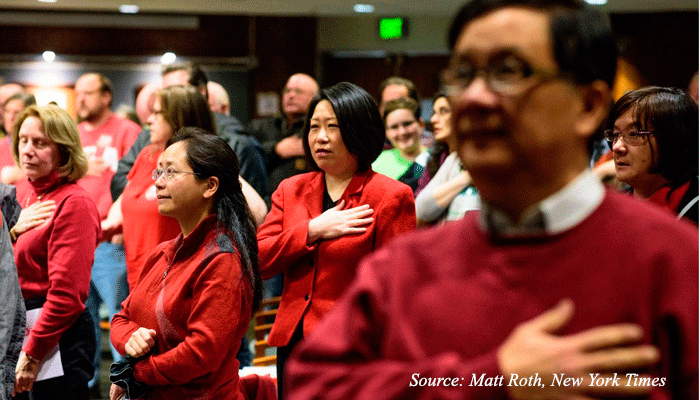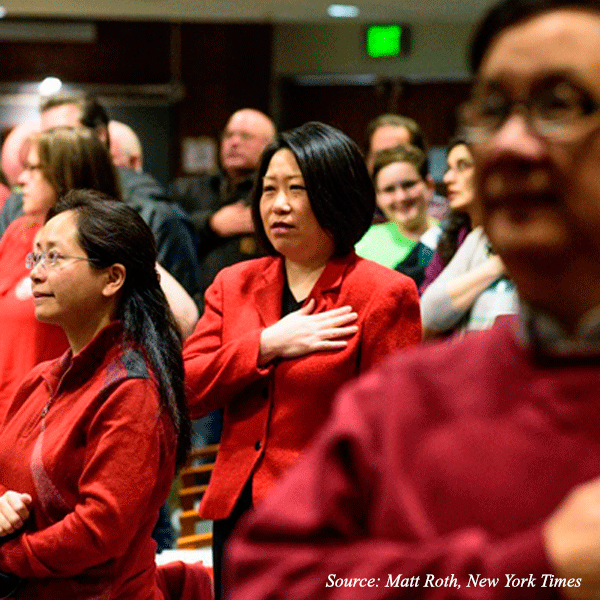
by Lil Tuttle
Howard County, MD, runs between Washington DC and Baltimore MD. It is a liberal stronghold with “twice as many Democrats as Republicans” where “one in five residents was born abroad.” Lawmakers thought “making Howard County a sanctuary for undocumented immigrants” was a “natural move.” They were wrong.
In passionate testimony before county legislators, and in tense debates with liberal neighbors born in the United States, legal immigrants argued that offering sanctuary to people who came to the country illegally devalued their own past struggles to gain citizenship.
Some even felt it threatened their hard-won hold on the American dream.
Their objections stunned Democratic supporters of sanctuary here and helped bring about the bill’s demise in March. A similar proposal for the state collapsed this month in the Maryland Senate, where Democrats also hold a two-to-one advantage. Some of the same immigrants spoke out against it.
New York Times reporter Sabrina Tavernise interviewed several of the legal immigrants who voiced their passionate objections to sanctuaries for illegals. Their stories are compelling and well worth reading in their entirety.
The Lawyer – born in China and now a naturalized U.S. citizen – “sees his whole life as a struggle to achieve his Americanness.”
Being in America is such a high privilege … You cannot easily give that privilege to somebody without going through some kind of [legal] process. It’s like giving lots of gold for one dollar.”
The Carpenter – born in El Salvadore – illegally overstayed his visa but subsequently chose to follow U.S. law to become a permanent legal resident. He worries about the growing presence of El Salvadoran MS-13 gang members in the area and the greater “susceptibility” of illegal children to recruitment. He argues there shouldn’t be “a safe space to remain here illegally.”
I have three daughters and I’m thinking about them. Don’t I have the right to be afraid that this kind of stuff is increasing?
The Entrepreneur – a legal U.S. resident born in India – believes sanctuaries for illegals “would lead to an increase in crime.”
He conceded that his evidence was only anecdotal. But the research that liberals were always sending him to change his mind was unsatisfying. “It’s always crime statistics for all immigrants,” he said. “It’s true — crime is very low for legal immigrants. But I want to know about illegal immigrants. Nobody has statistics for that.”
Mr. Pal is a Democrat, like most Indian-Americans. He voted for Mrs. Clinton. But in the rush to oppose Mr. Trump, he believes, Democrats moved too far left on immigration.
The Statistician – a naturalized U.S. citizen who left China shortly after the student uprising – believes illegal sanctuaries are an open invitation for more illegals. She worries that “public-school classes would swell and teachers would be spread thin.” Her testimony before county officials and legislatures was a tearful experience.
“I talked a lot about how many years it took to get citizenship, and I actually started crying. One person said, ‘Don’t do that!’ And someone else said, ‘Let her cry!’”
Surprisingly, or perhaps not so surprising, these legal immigrants share many of the concerns and frustrations expressed by native-born Americans: Sanctuaries do not solve the illegal immigration problem. Instead, sanctuaries exacerbate those problems while also derailing any serious effort to reform the existing immigration system.
Ying Ma, a naturalized U.S. citizen who came from China with her family as a young girl, can easily relate to the experiences of these immigrants. Ying is the author of “Chinese Girl in the Ghetto” and a CBLPI campus speaker. She will be discussing the immigration issue at our Florida Women’s Summit in Orlando this coming weekend.
“The failure of the sanctuary bills in Maryland reveals a potentially troublesome fissure for Democrats as they rush to defy Mr. Trump,” writes reporter Sabrina Tavernise. “Their party has staked out an activist position built around protecting undocumented immigrants. But it is one that has alienated many who might have been expected to support it.”

